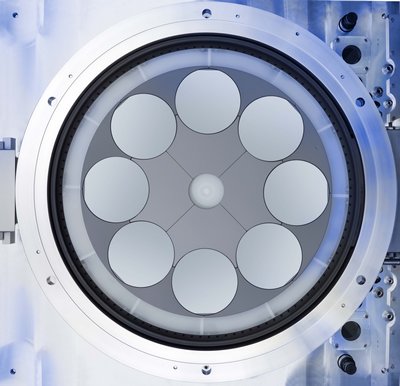German MOCVD manufacturer Aixtron and Chinese investor Grand Chip Investment are determined to complete the acquisition business transaction despite objections raised by the Committee on Foreign Investment in the United States (CFIUS).
U.S. officials requested the German Economic Minister to halt Aixtron’s sale to Grand Chip Investment, due to U.S. national security concerns, and CFIUS reviewed the tender offer by the Chinese investment company. However, the perspective lapsed on Nov. 17, 2016 at midnight.
 |
|
Aixtron's Planetary Reactor. (Photo courtesy of Aixtron) |
CFIUS informed GCI and Aixtron that the transaction should be called off because of unresolved U.S. national security concerns that were raised with the proposed transaction. Aixtron and GCI will be appealing directly to U.S. President Barack Obama to approve the deal within a 15-day timeframe.
According to a Wall Street Journal report, sources familiar with CFIUS work cited GaN technology was the main cause of national security concerns.
CFIUS comprises of representatives from 16 U.S. departments and agencies, including from Treasury, Homeland Security and Defense departments. Many of its deliberations are confidential and the decision-making process can be rather opaque.
GaN drivers, for instance, are often used in military applications such as radar transmissions because it can be driven at high power and voltages, while using less electricity. Aixtron sold products focused on GaN for years to U.S. defense contractor Northop Grumman, and Raytheon that have both signed contracts with the U.S. military over products that use GaN technology.
According to the Wall Street Journal report, The Pentagon has been using GaN to boost performance such as by the U.S. Navy to jam enemy radars, in antimissile systems such as Terminal High-Altitude Area Defense, or Thaad missiles that will be deployed in South Korea to counter North Korea’s long-range rocket threat.
GaN’s high thermal resilience and ability to be driven at high voltages makes it a material that can improve military applications such as radar transmitters by boosting their power while consuming less electricity. Aixtron has been selling products focused on GaN for a number of years to companies including U.S. defense contractor Northrop Grumman Corp. The company, like its rival Raytheon Co., has signed contracts with the U.S. military over products that use GaN technology.
Grand Chip’s insistence on acquiring Aixtron is a defiant showdown against the U.S. government’s national security concerns, reported New York Times.
The prospects of the EUR 670 million ($710 million) acquisition of Aixtron by Grand Chip Investment appears increasingly slim.
Usually companies will drop the deal with such recommendations, but Aixtron and Grand Chip have unusually appealed to U.S. President Barack Obama to approve the deal.
The developments show growing tension between U.S. and China as the latter country becomes vocal about its goal to become a global power in microchips, and is taking major leaps to bridge the technology gap in the semiconductor chip industry.
Even though Aixtron is not a U.S. company, it could receive considerable backlash from the lack of American approval, since a large chunk of its business dealings is in the country.












